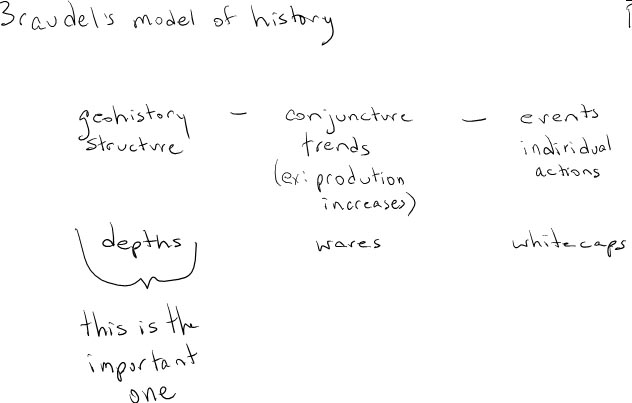HST287 Class notes 30-Sept-2004
Burke, French Historical Revolution
I presented (no, you read--different animal altogether)
After-notes:

What is the conflict? Why are we obsessed with individuals? (Are we as
humans, or are we as 21st century USers?)
One problem with Braudel's model: it doesn;t take into account movement
in the other direction: individual events/people can effect trends,
trends can have an impact on geology.
Good history vs. bad history: would Braudel call Burke's book history?
Not large/sweeping enough? Does the post-Braudel Annales fragmentation
mean there is room for many kinds of history? And what about the fact
that most of the writing in the Annales itself, being a journal, was
short?
Sigh--Braudel could write a monumental work because of the time, and
later the research team. How is the current model of publish or perish,
emphasis on short and quick, shape what academic history writing looks
like?
Voluntarism: humans have choice and their actions have impact
(expressed as predestination in some cultures?)
Robert: Are there trends in the bootom layer? Yes, the mini ice-age,
etc. and its effect in changing structures of human life
Mediterranean: by focusing on geohistory he has to frame the
Mediterranean, something more permanent, not the ephemeral
countries/states surrounding it.
Braudel is not interested in mentalities, more interested in material
culture.
Montaillou: Ladurie is most successful at pulling together broad themes
and making them personal.
Craig: "I'm becoming more of a purist: the individual is the important
thing."
(How much of our emphasis on the individual, our happiness with
Ladurie, etc. a product of our own "western" culture/history/structures
with their privileging of the individual?)
Board:
What is history? Is it the living conditions of peasants in the 16th
century and patterns of seasonal migration? Or is it the problem: what
do the movements of these people tell us about their history/culture?
Sean: "The opposite of one profound truth may well be another profound
truth."
(Then again, this is a very individualistic look: truth as defined by
the individual, we create truth in our own image, etc.)
Questions:
Sean: Why haven't we heard of the Annales? Depends on your background.
Robert: they were so successful that their ideas were picked up and
used by many, diffused
David: Annales couldn't be used to study the 20th century. Why not?
Corrolary: when does history begin? yesterday, 10 years ago, 200 years?
Bogac: We dohistory all the time but it is not necessarily academic
history? It is actually really an arbitrary designation.
Colin: New methods can improve upon the past but it doesn't negate
previous work.
Can we generate something new without finding the previous deficient?
Does change always mean revolution? (Hmm...what about Mozart?)
Elizabeth: the question of retrogression. Can you understand the
present without understanding the past? Ian: both will have a certain
amount of subjectivity.
Robert: so many variables can't be explained. You can't explain life
itself but you can explore relationships.
What makes "good" history.
hope.greenberg@uvm.edu,
created/updated: 30-Sept-2004/1-Oct-2004
Back to HST287
